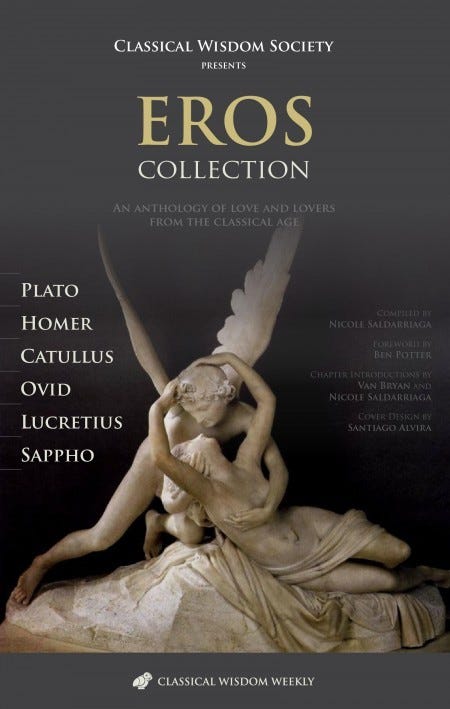Dear Classical Wisdom Member,
Welcome to another Valentine’s Day. It’s that special moment that long time married folks don’t notice, solo flyers despise and young lovers spend inordinate about of time, worry and money to commemorate.
But let’s forget about the flowers and chocolates for a second and address the root of it all: that of Love.
Just as the Sami, the indigenous Swedish people, have innumerable words for snow (some say 300), so too did the ancients have multiple terms for something so fundamental to the human condition as Love.
Indeed, it’s quite the embarrassment that English fails so miserably on this task. I say, it’s time to bring back some of these ancient concepts! Just imagine how much clearer your Valentine’s Card can be.
So with that in mind, today’s special Classical Wisdom Member’s article will delve into all the important distinctions between Love. Learn about philautia, Agape, Ludus, Philia and more, below.
Plus! As an added bonus in honor of the day, we’ve released the Eros Collection.
Whether it was Homer, who espoused that it was the love Odysseus felt for his wife which allowed him to triumph over so many obstacles, or Plato who writes on the origins and functions of love in his The Symposium, there is an absolute treasure trove of classical love stories from the ancient world.
Classical Wisdom Members can access the ebook here:
Now, onto all the ways the ancients defined love, below.
Happy Valentine’s Day!
All the best,
Anya Leonard
Founder and Director
Classical Wisdom
ANCIENT AMOUR: ALIVE & WELL
By Ben Potter
For our special, mid-February, lovefest edition I thought I would engage the grey matter, stretch the analytical muscles and pose one of the most ambitious questions ever to be asked in all the annals of mankind: ‘what is love’?
But then I thought… hmmmm… tricky one that. Pass.
Well, not pass exactly, but, using my most precious parenting/teaching skills, change the question into something I can actually answer and then pretend that was what you wanted to know about in the first place.
So, let’s examine what the Ancients thought about love.
Starting, as is our wont, with the Greeks, we should probably establish first principles; what did they actually say love was? “A lot more than we ever could” is the surprising answer.
Despite giving us romantic wordsmiths like Shakespeare, Byron, Keats, Wordsworth, Cummings and Whitman, the English language is not overly replete with definitions of different types of love i.e. you can just as easily say you ‘love’ your spouse, your kids, your dog, your parents, your sandwich, or Game of Thrones.
The Greeks, with about 30 different words for love, had no such restriction.
Keep reading with a 7-day free trial
Subscribe to Classical Wisdom to keep reading this post and get 7 days of free access to the full post archives.





